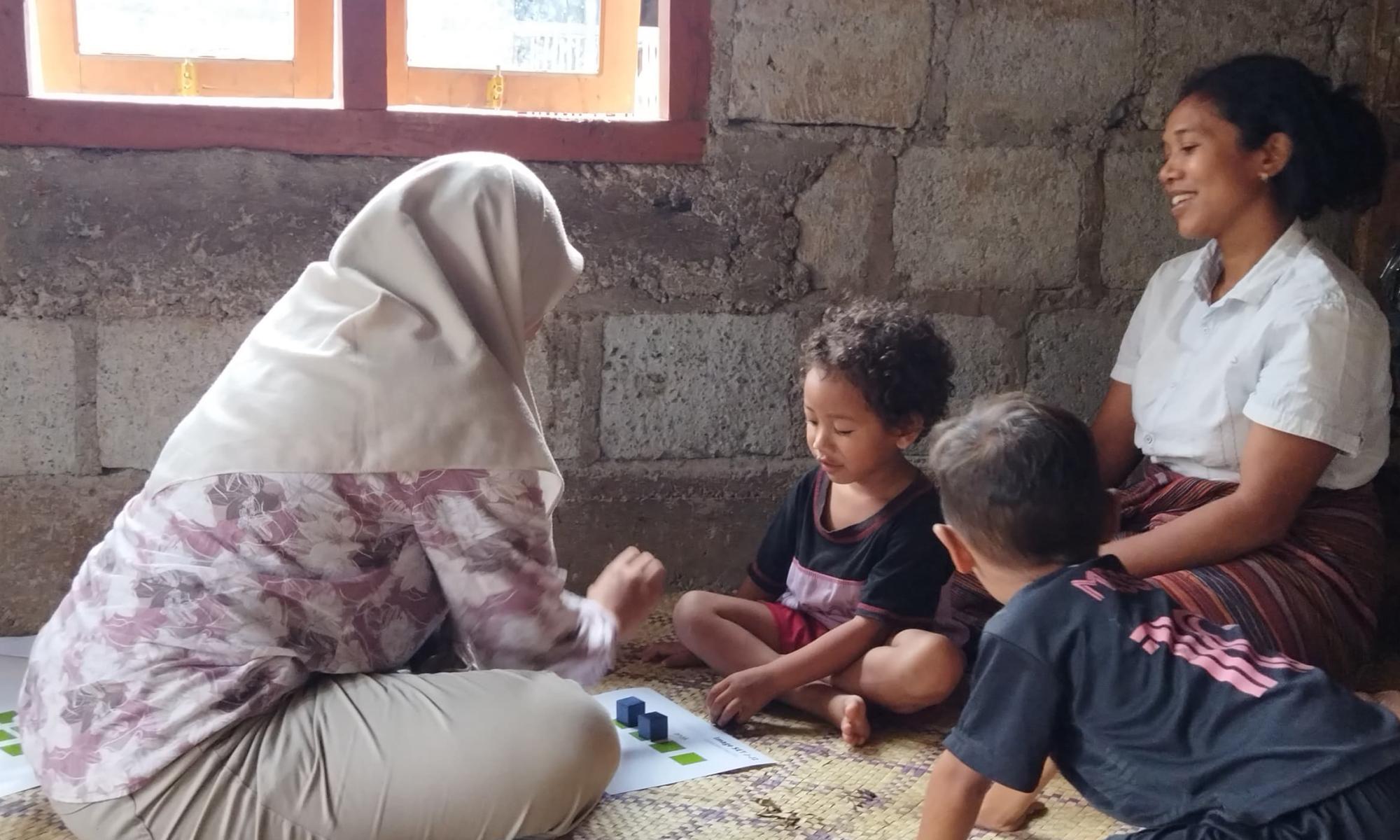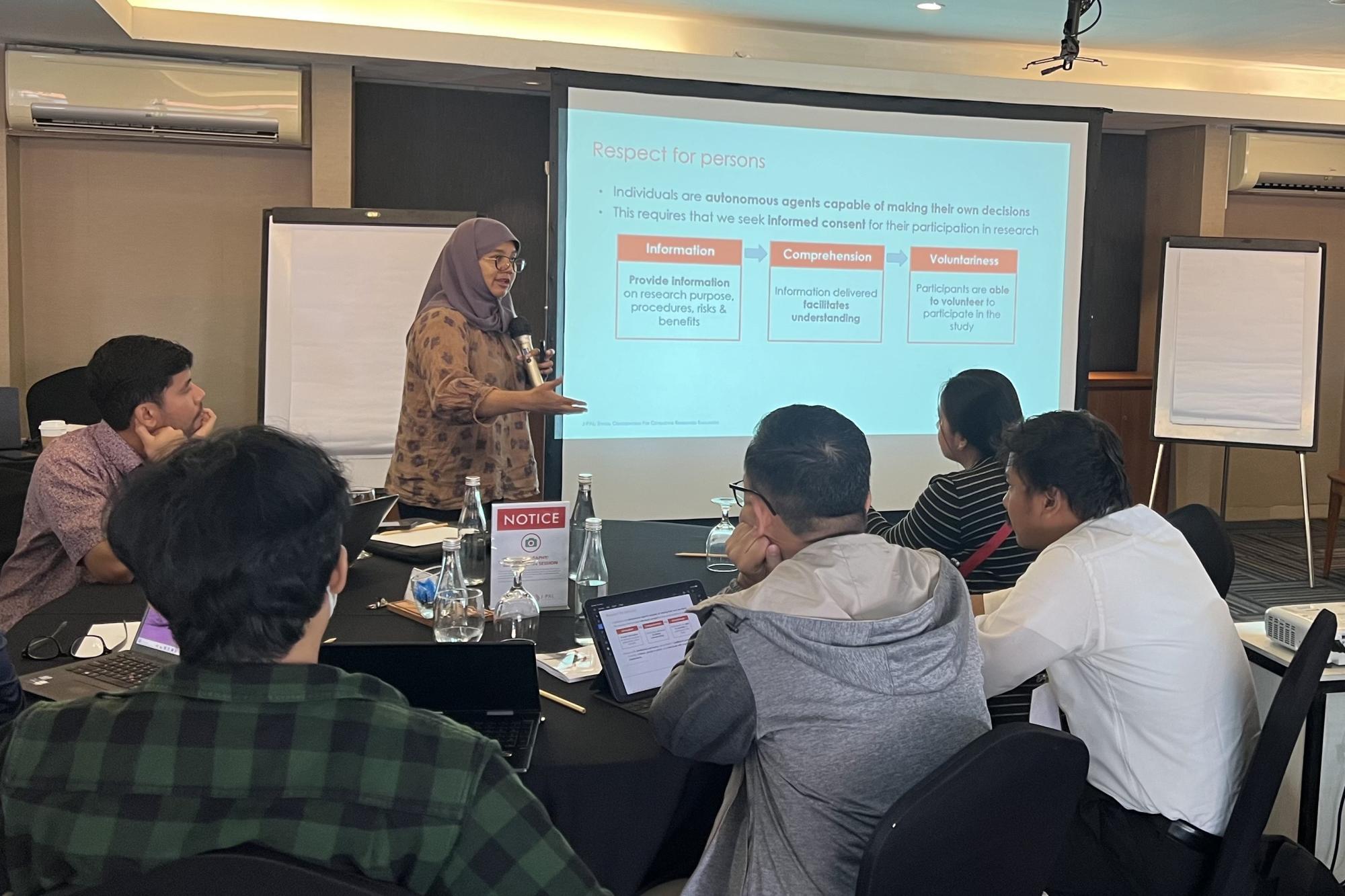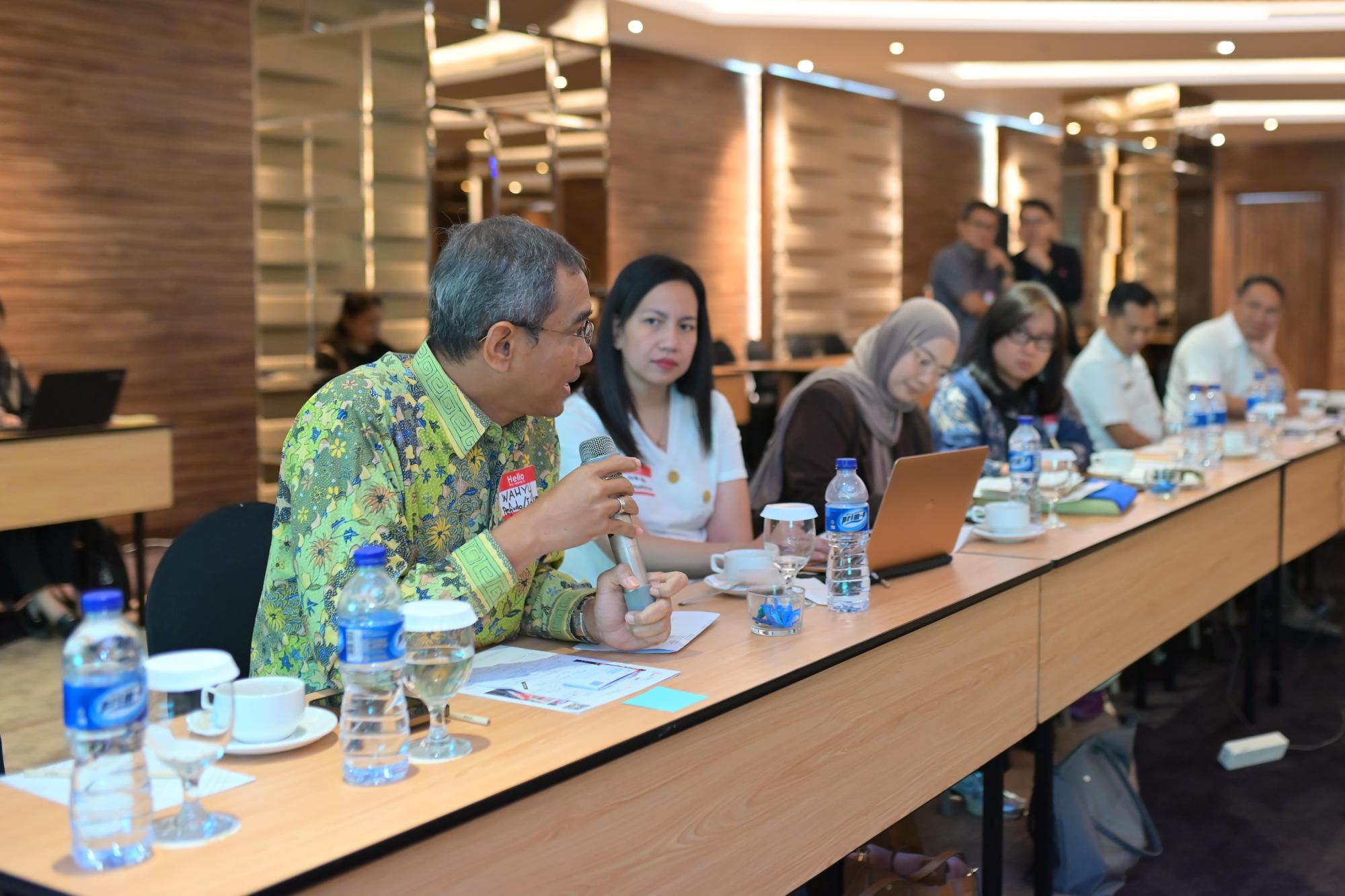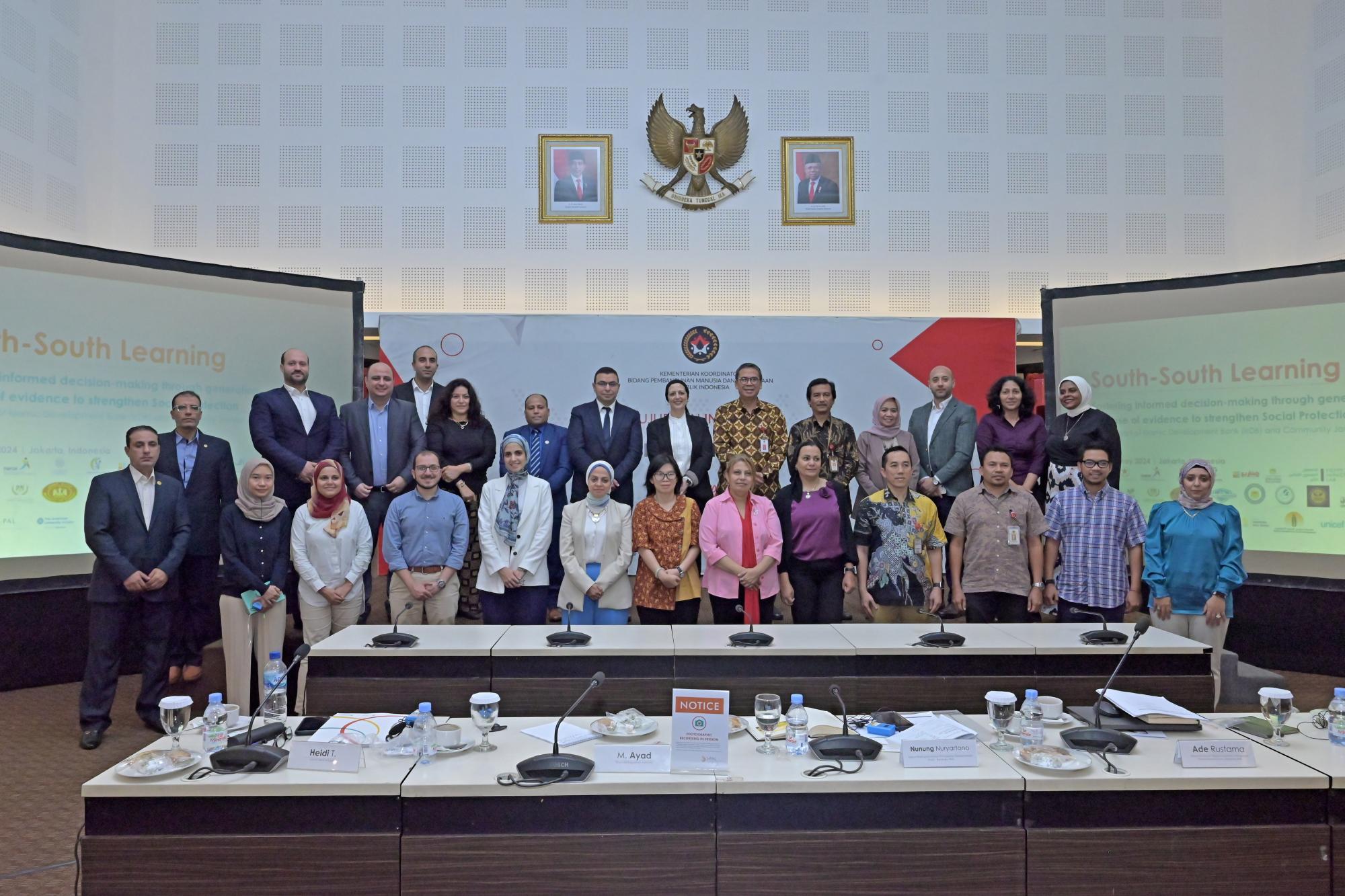
J-PAL Southeast Asia

Hosted by

Letter from the Executive Director
2024 has been a year of opportunity and progress. Indonesia’s governmental transition was a key moment to leverage learnings from our past research to inform future policies and programs. In this context, our team closely collaborated with key ministries, sharing lessons learned to support policy and program development in critical areas such as firm growth, financial inclusion, and air pollution.
This year also underscored the importance of building partnerships and generating research to support Indonesia’s evolving development goals. We expanded collaborations in the education and firms sectors, leading to the co-creation of evaluations of the government’s flagship literacy program and MSME mentorship program.
Aligned with the government’s priority to address learning loss, we also shared insights from our recently completed impact evaluation on technology and teacher training in math, emphasizing the need for program targeting and teachers’ pedagogical skills.
And leveraging our social protection portfolio, we were honored to host the Government of Egypt, with J-PAL MENA, to exchange insights on the journey in strengthening the countries’ social protection systems.
We remain committed to growing the network of researchers in the region, offering customized training in impact evaluation, along with coffee chats and learning hubs to connect J-PAL affiliates with researchers and practitioners. We also continue to support early-career researchers with scholarships from the Riady Foundation and our new scholarship program for the MicroMasters Program in Data, Economics, and Design of Policy.
Looking ahead, we remain dedicated to pursuing research areas vital to Indonesia’s development, including early childhood development, digital financial inclusion, firm growth, and social protection. Thank you to our many collaborators for your vision and support of J-PAL Southeast Asia; we look forward to continuing to work together to tackle poverty and climate change across the region.
Lina Marliani
Executive Director, J-PAL SEA
J-PAL Southeast Asia Leadership
J-PAL Southeast Asia in Review
Informing the programs and policies of Indonesia’s incoming government: As Indonesia transitions to a new government, our policy team has been actively working to ensure that evidence-informed decision-making plays a central role in shaping the new government’s policies and programs. Building on lessons learned from past research, we have been engaging with key ministries to strengthen the use of research evidence in areas such as firms, financial inclusion, and air pollution.
- An example of this is our work with the Ministry of Development and Planning, in which we provided evidence-based insights that helped inform and expand the design of a start-up financing program. These partnerships are part of our ongoing commitment to promote the creation of policies and programs grounded in rigorous research.
Expanding our network of local and Southeast Asian researchers who can use, design, and implement impact evaluations: We believe that research led by local scholars, grounded in the local context, can lead to more policy-relevant outcomes. To further this goal, we are deepening our engagement with local and regional researchers by offering opportunities for collaboration and capacity building.
- This year, we expanded our engagement with universities in East Java to spark discussions on evidence-informed policymaking and explore potential collaborations. We hosted customized impact evaluation training and the Evaluating Social Programs course in Indonesia and Malaysia, training policymakers, researchers, and development practitioners from international and nonprofit organizations to conduct high-quality evaluations of social programs.
- We organized coffee chats and a learning hub to encourage knowledge sharing between J-PAL affiliates and local researchers to help catalyze international research collaborations.
- We awarded 24 scholarships for the Data, Economics, and Design of Policy (DEDP) MicroMasters through the support of the Riady Foundation, and launched the J-PAL SEA DEDP MicroMasters Scholarship to support early-career researchers and development practitioners in Southeast Asia in strengthening their impact evaluation skills.

Continue building fit-for-purpose and scalable research in the education sector: Building on J-PAL’s extensive work in the education sector, our policy and research teams developed a close partnership with Indonesia’s Ministry of Education, Culture, Research, and Technology.
- Leveraging our network of affiliates and knowledge from past research, we facilitated sessions to enable ministry staff to consult about their programs with our expert affiliates, and supported them in developing effective monitoring & evaluation strategies. This led to the co-creation of an ongoing evaluation of their flagship literacy program.
We also remain committed to conducting rigorous research aimed at improving education outcomes for students. In 2023, our affiliates contributed new insights on the impact of technology and pedagogy training on students’ numeracy learning outcomes, highlighting the importance of targeting and teachers’ pedagogy training in improving learning. As Indonesia continues to address the learning gaps exacerbated by the Covid-19 pandemic, we aim to leverage these insights to inform programs and policies addressing the challenge.
Expanding our partnership with local governments to accelerate MSME growth: Through our Innovation for MSME Development Initiative, we have been working closely with the government of Indonesia to support micro, small, and medium enterprise (MSME) development as a pathway out of poverty.

Sharing lessons learned from our work in social protection in a “South-South learning journey” between the Indonesian and Egyptian governments: Since our establishment in 2013, J-PAL SEA has developed a vast body of knowledge on the design and delivery of social protection systems. Building on the lessons learned, J-PAL SEA, in collaboration with J-PAL MENA through its government-embedded lab, the Egypt Impact Lab, J-PAL Global, and supported by the Islamic Development Bank and Community Jameel, hosted a South-South Learning Journey for government officials.
The event served as a platform for policymakers from the Governments of Egypt and Indonesia to exchange insights on effective strategies for creating more responsive social protection systems.The learning journey underscored the commitment of both the Egyptian and Indonesian governments to strengthen their safety nets, grounded on rigorous evidence, to effectively address their development challenges.

The Year Ahead
- Addressing the demands for evidence and pressing policy questions in the early childhood development (ECED) sector: Despite the numerous ECED programs, barriers like sustaining behavior change and maintaining the quality of services at scale hinder long-term impact. Next year, we aim to explore innovative solutions, such as strengthening existing health, education, and social assistance infrastructure or leveraging the role of caregivers. We will also work with stakeholders in incorporating evidence into program design
- Explore programs to support digital financial inclusion and MSME growth: In 2025, we will continue exploring ways to support digital financial inclusion and MSME growth through our initiatives, Innovation for MSME Development Initiative and Inclusive Financial Innovation Initiative. Our focus will be on identifying what works, especially for women and women entrepreneurs. We also strive to deepen our collaboration with the private sector to learn more about the many innovative solutions currently in place and promote the use of evidence in the design of their programs.
- Continue to promote evidence use and generation in social protection: We are laying the groundwork for a collaboration with the Government of Indonesia to gather evidence on an empowerment program led by the Ministry of Social Affairs. This program supports traditional social assistance beneficiaries in transitioning to entrepreneurial roles. Next year, we aim to integrate a randomized evaluation design into this government-run program, ensuring a robust assessment of its impact.
In case you missed it: Highlights from 2024
- Four lessons from using a growth measurement tool for early childhood development in Indonesia
- Building effective social protection programs through government and researcher partnerships: Reflections from a MENA-SEA South-South Learning Journey
- Using alternative data and artificial intelligence to expand financial inclusion: Evidence-based insights
- Can product curation overcome challenges in MSME market expansion? Opportunities for impact evaluation
Lead photo credit: Ajeng Permatasari, J-PAL


